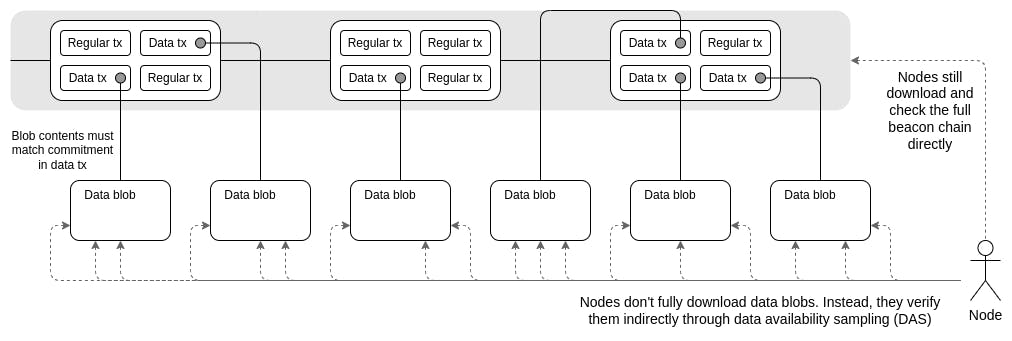EIP-4844: The Electric Car Solution to our EVM Gas Problem.
Can Proto-Danksharding for Ethereum Scalability be the Solution to Our Gas Problems?
EIP-4844, also known as "Proto-Danksharding," is a significant upgrade proposal for the Ethereum network aiming to address two major challenges: high gas fees and scalability limitations.
The Problem:
Currently, Ethereum utilizes a single blockchain to store all transaction data, leading to congestion and high gas fees during periods of high activity. This bottleneck hinders user experience and limits the network's potential for widespread adoption.
EIP-4844's Solution:
This upgrade introduces three key innovations to tackle these issues:
Blob-Carrying Transactions:
Introduces a new transaction type capable of attaching large data segments ("blobs") without incurring exorbitant fees.
This enables efficient storage of bulky data, particularly for rollups, significantly reducing their overall gas costs.
Data Availability Sampling:
Implements a mechanism for verifying the existence of data within blobs without downloading the entire data chunk.
This ensures data integrity while minimizing storage requirements and gas consumption.
Delayed Data Removal:
Allows storing blobs on the Ethereum consensus layer for a predetermined period before automatic deletion.
This guarantees data accessibility for verification purposes while maintaining a manageable blockchain size.

Technical Implications:
EIP-4844 introduces several technical changes to the Ethereum protocol:
State Rent: Introduces a mechanism called "state rent" to incentivize efficient data usage by charging users for storing data on the blockchain.
Data Availability Checks: Implements cryptographic techniques for verifying the availability of data within blobs without requiring full downloads.
Off-Chain Data Availability: Enables the use of off-chain data storage solutions, further reducing on-chain storage demands.
Impact and Benefits:
The successful implementation of EIP-4844 is expected to yield significant benefits for the Ethereum ecosystem:
Reduced Gas Fees: By offloading bulky data to blobs, users will experience drastically lower transaction fees, especially for rollups.
Increased Scalability: By optimizing data storage and processing, the network will be able to process more transactions per second, leading to improved scalability.
Enhanced Rollup Performance: Rollups, a Layer 2 scaling solution, will benefit greatly from reduced gas fees and improved data handling capabilities.
Sustainable Growth: EIP-4844 paves the way for future scaling solutions, ensuring the Ethereum network can accommodate future growth and adoption.
Current Status and Future:
EIP-4844 is currently under active development and testing on several public and private testnets. There's active testing on Goerli, Sepolia, and Rinkeby. The final specifications are being finalized, and a mainnet launch is anticipated in late 2023 or early 2024.
Conclusion:
EIP-4844 represents a significant step towards a more efficient, scalable, and cost-effective Ethereum network. Its implementation has the potential to revolutionize the way users interact with the network and unlock new possibilities for the Ethereum ecosystem.
Stay Informed:
For further information and updates on EIP-4844, you can refer to the following resources:
Official website: https://www.eip4844.com/
Ethereum Foundation blog: https://blog.ethereum.org/
Testnet documentation: https://docs.prylabs.network/docs/getting-started
Client updates: https://nimbus.guide/
Community forums: https://ethereum-magicians.org/

